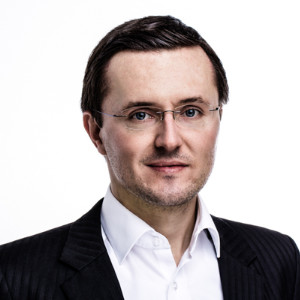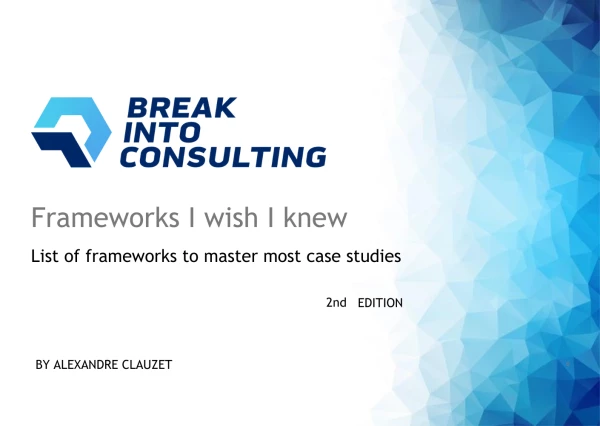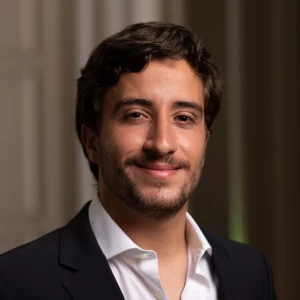What if my framework doesn't match the direction of the case during a consulting interview?
Framework doesn't match the case - what to do?


Hi Matthias!
This happens quite often. And the simple, but admittedly somewhat frustrating answer is: don't use a framework at all! Using pre-conceived buckets/topic lists/focus areas will always expose you to an immense risk of missing out crucial elements.
The key to become independent of this framework-mentality is to REVERSE YOUR THINKING. Instead of trying to outline all possible areas that could be relevant (an endeavor which is by the way impossible to achieve!), start your thinking from the precise question at hand! Then define, what needs to be true to answer this question in one way or another? And then work out, how you can test as clearly as possible, whether it is true or not. The areas to look into are then just a corollary of this logic. There are a couple of principles that you need to understand and internalize in order to build the skill to create such logic-based structures, but at the end of the day, this is how senior leaders at top consultancies think! (surprise surprise: they don't think in bucket frameworks ;)).
It will take some time to leave behind the mantra of the usual case preparation books - but it forms the base to make you a far stronger candidate than >95% of all candidates who rely on these usual books.
Cheers & all the best,
Sidi
Hi Matthias!
This can happen but is not a disaster.
You can do the following:
- after realizing your framework doesn't match think whether you can adjust it or use another approach for your answer;
- then ask for a few seconds to prepare your answer to present it in a structured and consistent way.
The key aspects should be included in your final answer but also have a clear structure.
Show that you can quickly change the approach and stand by the core issue at the same time. The ability to adapt to any situation is valuable.
Best,
André
If you realize during the case, that your framework doesn't fully fit, you can (and should) adjust it. If you can remain calm under the realization that your approach is the the right one and then tell the interviewer that you would like to take a few secons to think this through and then present an amendment to your framework that addresses the issues well, this will earn you credits. Never try to just power through and hope the itnerviewer won't notice how you're going outside of your original framework. They will notice and reduce your performance score.

Hi Matthias,
It might not have been perfect in the first place, but even this you don't really know - depending on the very limited information initially available, the case might progress in a different direction than anticipated (especially true for many interviewer-led McKinsey cases).
The most important aspect to consider is clarity and explicit (meta-)communication. Once you realize that the case is progressing differently, it's time to go 1 step backwards and also explicitly communicate this finding to your interviewer. Probably its good (if possible) to take a few seconds of time to adjust to the new direction and go from there!
Hope that helps - if so, please be so kind to give it a thumbs-up with the green upvote button below!
Robert

Hi Matthias,
Honestly, your framework matching the case matters a lot less than you think!
Your framework needs to show good critical thinking ability, good structure, and a clear approach to solving the problem. It does not need to match the case!
I think for about 50% of my interviews, my framework didn't end up being used at all. And, I aced all 8 of my interviews with companies (i.e. 16+ rounds).
Much more important is that, during the case, you understand clearly what you're trying to solve for and why, that you parse through information effectively, that you take guidance and are agile/adaptable to changes in the case. That's what matters!

Hi,
That's absolutely fine. One thing you should understand - your structure is not just the initial structure. You should be constantly structuring through the case. So just take a minute and come up with a new structure
Also, stop using the work Framework. You should come up with a structure, not just a pre-made framework.
Best
Hi,
It may happen that during the case you realize that your framework doesn’t match the case.
IT IS NOT A DISASTER!
You should ask the interviewer to give you a few moments as you would like to develop a more tailored framework.
If you struggle with choosing the right framework don’t hesitate to message me.
I will send you an algorithm for improving your structuring skill.
Thanks,
Anton

Hi Matthias,
I would advise you to make your framework fit the case and not the other way around. This means that you should try adjusting your framework or creating (maybe combining two or more) to address what is being asked in the question.
You should know the different frameworks but I do not advise you to learn them by heart. Give yourself a chance to customize them so that they fit in your case.
I hope this helps!
Mehdi
It is usually a bad idea to use a standard framework in a solving a case or problem in general.
What I would do is to focus on anwering the question and do the following thought process:
- What is the question?
- What do you need to know to answer the question?
- To know what you need to know, what analysis you need to do?
- To do the analysis what data do you need?
That should work in most problem solving situation













